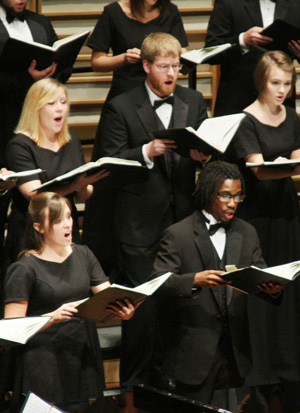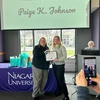|
Thursday, Dec. 10, 7:30 p.m., St. Paul's Cathedral (Buffalo): Adults pre-sale: $20, Students pre-sale: $10 |
Update: Buffalo concert has been cancelled due to weather.
In the annual Holiday Concert for the Community, the SUNY Fredonia School of Music presents Handel’s "Messiah" with two captivating performances — one in the acoustically acclaimed Rosch Recital Hall on the Fredonia campus and a second at the architecturally stunning St. Paul’s Cathedral in Buffalo, N.Y.
The concert in Fredonia is Wednesday, Dec. 9, at 7:30 p.m.. The Buffalo concert is Thursday, Dec. 10, at 7:30 p.m.
This year's performance features the Fredonia College Choir alongside a professional chamber orchestra and special guest soloists Kendra Colton, soprano; Deborah Rentz-Moore, Mezzo-Soprano; William Hite, tenor; and David Kravitz, bass. This beloved event traditionally brings a broad audience and a full house to welcome in the holiday season with the exceptional voices and outstanding instrumentalists.
Unlike many performances of Messiah, the School of Music presents the historic work in its entirety.
“It is a collection of scripture from the Old and New Testaments without named characters and no tangible plot. Yet Messiah has usurped all of Handel's other oratorios as the best known and most beloved,” said director Gerald Gray.
“In 1749 Messiah finally received the public acceptance in London that had eluded it since its Dublin premier," he added. "The occasion was a mid-day charity performance, in the chapel of the Foundling Hospital, presented ‘for the maintenance and education of exposed and deserted young children.’ It was in the Foundling Hospital Chapel that Handel’s Messiah found it’s home and it was there that Handel presented Messiah for the remaining decade of his life.”
Composed in the summer of 1741 and premiered in Dublin in 1742, Messiah is Handel's most famous work. Although the work was envisioned for theatre during Lent and Easter, it is now mostly performed in preparation of the Christmas holiday season.
The performance, directed by Gerald Gray, is influenced by some of the great Baroque interpreters of our time and promises brisk tempi and heightened drama all with a distinct Baroque sensibility.”
Artist Bios:
American soprano Kendra Colton has been soloist with leading orchestras including the Boston Symphony Orchestra, Los Angeles Philharmonic, San Francisco Symphony, Minnesota Orchestra, Pittsburgh Symphony, Indianapolis Symphony, Houston Symphony, and the National Symphony, under conductors including Bernard Haitink, Sir Neville Marriner, Nicholas McGegan, John Nelson, Seiji Ozawa, Helmuth Rilling, Christopher Hogwood, Harry Bicket, and Bruno Weil. Particularly sought-after for baroque and classical repertoire, Miss Colton sings nearly all the Passions, Masses and Cantatas of Bach; Handel oratorios including Messiah, Solomon, Saul, Israel in Egypt, Judas Maccabaeus and others; Mozart concert arias and masses including Exsultate Jubilate, Mass in C minor, Coronation Mass, Requiem and others; Beethoven's Missa Solemnis, Mass in C, and Symphony No. 9; and Haydn's masses and oratorios.
William Hite has been described by the Boston Globe as "a breathtaking communicator", the San Francisco Chronicle remarked that Hite in Purcell's King Arthur "lavished the music with considerable eloquence", and the Wall Street Journal deemed his Apollo in Monteverdi's Orfeo "outstanding". The Boston-based tenor's warm tone and vivid portrayals have garnered critical acclaim all over North America with early music groups, symphony orchestras and opera companies. He has appeared with such groups as the American Symphony Orchestra, the Boston Symphony, the Washington Bach Consort, the New York City Ballet, the National Arts Centre Orchestra (Ottawa), the Handel and Haydn Society, Boston Baroque, Tafelmusik and Philharmonia Baroque in repertoire from the Baroque to contemporary music.
The American mezzo-soprano, Deborah Rentz-Moore, is a soloist in early music, oratorio and contemporary works, and has performed with some of the most celebrated ensembles in North America, including the Handel & Haydn Society, Emmanuel Music, The Boston Camerata, The Boston Early Music Festival, Aston Magna, Publick Musick, New York Collegium, Magnificat, and the Mark Morris Dance Group. Although specializing in vocal works of the Renaissance and Baroque periods, Deborah Rentz-Moore’s work encompasses many vocal styles. She has been a featured soloist with the Boston Camerata since 1999. In addition to her performances in their medieval, renaissance and early American repertoire, she is featured on their acclaimed Shaker music recording, “The Golden Harvest” (on Glissando).
Baritone David Kravitz is increasingly in demand on operatic and concert stages around the country. Mr. Kravitz's 2008-2009 opera season featured company debuts with Glimmerglass Opera (La traviata and The Consul) and American Lyric Theater in New York City, as well as return engagements with Opera Boston (Der Freischütz and The Bartered Bride). Previous seasons have included appearances with James Levine and the Boston Symphony Orchestra (Les Troyens and Moses und Aron), and Opera Theatre of St. Louis, where critics hailed his "perfect comic timing" and "commanding" performance as Ko-Ko in The Mikado.




